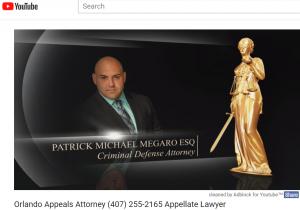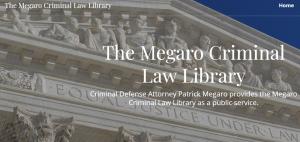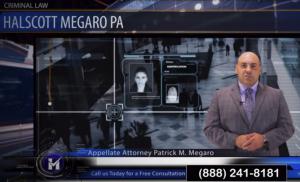Criminal Defense Attorney Patrick Megaro discusses Gamble vs. United States, now pending before Supreme Court
U.S. Supreme Court has granted certiorari to review whether criminal prosecution in federal and state court violates the Double Jeopardy Clause
Halscott Megaro PA (N/A:N/A)
Gamble v. United States is a case being appealed from the U.S. Court of Appeals for the Eleventh Circuit, originating from the state of Alabama. The defendant Terance Martez Gamble was pulled over in a traffic stop in 2015 for a broken taillight. During the stop, the police officer found a gun in Gamble’s car. Because Gamble had a prior conviction for felony robbery, he was barred from owning a firearm. Gamble was charged with illegal possession of a firearm by the state of Alabama and served one year in state prison. Afterwards, Gamble was charged by the Federal Government arising out of the same incident under the federal statute forbidding illegal possession of a firearm. Gamble was convicted and is currently serving time in federal prison.
Gamble challenged the federal prosecution during the trial in federal district court and then subsequently on appeal as violation of the Double Jeopardy Clause of the U.S. Constitution. A well-known constitutional protection, the Double Jeopardy Clause of the Fifth Amendment bars subsequent prosecution for the same offense.
Gamble’s challenge was denied due to a long-established exception to the Double Jeopardy clause known as separate or dual sovereigns doctrine. The doctrine holds that a particular criminal act is an offence against both the federal and state government or sometimes multiple state governments, which are distinct and separate sovereigns. In Heath v. Alabama, 474 U.S. 82 (1985), U.S. Supreme Court explained that “[t]he dual sovereignty doctrine is founded on the common law conception of crime as an offense against the sovereignty of the government. When a defendant in a single act violates the ‘peace and dignity’ of two sovereigns by breaking the laws of each, he has committed two distinct ‘offences.’ . . . . As the Court explained in Moore v. Illinois, 14 How. 13, 19 (1852), ‘[a]n offence, in its legal signification, means the transgression of a law.’ Consequently, when the same act transgresses the laws of two sovereigns, ‘it cannot be truly averred that the offender has been twice punished for the same offence; but only that by one act he has committed two offences, for each of which he is justly punishable.’" Relying this long-standing exception, both the district court and Eleventh Circuit denied Gamble’s challenge.
Supreme Court’s cert is interesting given that it is reviewing a well-established doctrine in a case with fairly routine application of the principle. What adds intrigue to the cert is the fact that in Puerto Rico v. Sanchez-Valle, a 2016 case, Justice Ginsburg and Justice Thomas joined in a concurring opinion that discussed the need to revisit the separate sovereigns doctrine. While Sanchez-Valle case was decided on the Court’s finding that Puerto Rico did not have sovereignty independent from the Federal Government, Justice Ginsburg’s concurrence questioned the separate sovereigns doctrine as a whole:
"I join in full the Court’s opinion, which cogently applies long prevailing doctrine. I write only to flag a larger question that bears fresh examination in an appropriate case. The double jeopardy proscription is intended to shield individuals from the harassment of multiple prosecutions for the same misconduct. Green v. United States, 355 U. S. 184, 187 (1957). Current “separate sovereigns” doctrine hardly serves that objective. States and Nation are “kindred systems,” yet “parts of ONE WHOLE.” The Federalist No. 82, p. 245 (J. Hopkins ed., 2d ed. 1802) (reprint 2008). Within that whole is it not “an affront to human dignity,” Abbate v. United States, 359 U. S. 187, 203 (1959) (Black, J., dissenting), “inconsistent with the spirit of [our] Bill of Rights,” Developments in the Law— Criminal Conspiracy, 72 Harv. L. Rev. 920, 968 (1959), to try or punish a person twice for the same offense? Several jurists and commentators have suggested that the question should be answered with a resounding yes: Ordinarily, a final judgment in a criminal case, just as a final judgment in a civil case, should preclude renewal of the fray anyplace in the Nation."
Mr. Megaro notes that whether Justice Ginsburg and Justice Thomas tipped their hands in Sanchez-Valle will remain to be seen in Gamble v. United States.
The complete article and comment will be published on the Megaro Criminal Law Library website at https://themegarocriminallawlibrary.com/
About Patrick Megaro
Patrick Michael Megaro is an attorney at Halscott Megaro PA. His primary areas of practice are criminal defense, criminal appeals, post-conviction relief, civil appeals, and civil rights litigation.
Website: https://www.appealslawgroup.com/our-attorneys/patrick-megaro-esq/
The Megaro Criminal Law Library: https://themegarocriminallawlibrary.com/
Blog: https://patrickmegaroblog.blogspot.com/
Attorney Profile: https://criminal-defense-attorney.squarespace.com/patrick-michael-megaro-esq/
Patrick Megaro
Halscott Megaro, P.A.
(407) 255-2164
email us here
Visit us on social media:
Facebook
LinkedIn
What does Appeal mean? By Patrick Megaro, Criminal Defense Attorney
Legal Disclaimer:
EIN Presswire provides this news content "as is" without warranty of any kind. We do not accept any responsibility or liability for the accuracy, content, images, videos, licenses, completeness, legality, or reliability of the information contained in this article. If you have any complaints or copyright issues related to this article, kindly contact the author above.





